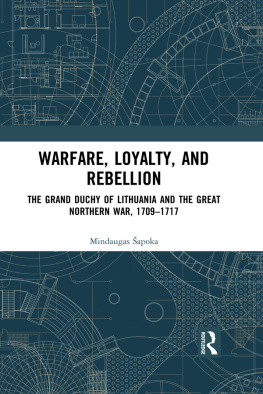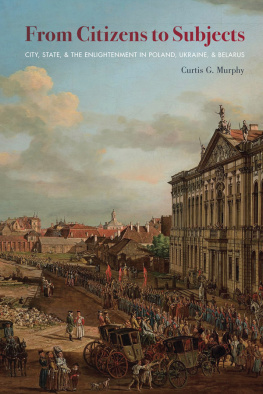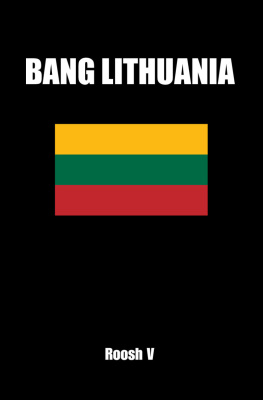Warfare, Loyalty, and Rebellion
This book examines the politics of the Grand Duchy of Lithuania during the crucial period between the Russian tsar Peter the Greats victory over Sweden at the battle of Poltava and the 1717 Silent Sejm, the Polish-Lithuanian parliaments session which is traditionally seen as responsible for opening the way to Russian domination of Polish-Lithuanian politics. It not only challenges the accepted view of the passivity of the Lithuanian gentry and their subservience to the Russians but also presents a clear view of how the Lithuanian economy and political system were functioning in 17101717, factors which have never been studied in depth in any language. apoka argues that much more blame for the Confederations of Vilnius and Tarnogrd that had led to the Silent Sejm can be attributed to the Polish king Augustus II than is argued by the conventional scholarship. By so completely and deliberately ignoring the Commonwealths institutions and refusing to work within them, the Polish king provoked justified suspicion that by destroying the basis of the consensual political system, he wanted to introduce absolute monarchy.
Mindaugas apoka was educated at Vilnius University and the University of Aberdeen, where he wrote his doctorate under the supervision of Profs. Robert Frost and Karin Friedrich. In 2015, he was awarded a one-year Junior Research Fellowship by the Institute of Historical Research at the University of London to research Jacobite connections with the Sobieski family. He is now employed as researcher at the Lithuanian Institute of History.
First published 2018
by Routledge
2 Park Square, Milton Park, Abingdon, Oxon, OX14 4RN
and by Routledge
711 Third Avenue, New York, NY 10017
Routledge is an imprint of the Taylor & Francis Group, an informa business
2018 Taylor & Francis
The right of Mindaugas apoka to be identified as author of this work has been asserted in accordance with sections 77 and 78 of the Copyright, Designs and Patents Act 1988.
All rights reserved. No part of this book may be reprinted or reproduced or utilised in any form or by any electronic, mechanical, or other means, now known or hereafter invented, including photocopying and recording, or in any information storage or retrieval system, without permission in writing from the publishers.
Trademark notice: Product or corporate names may be trademarks or registered trademarks, and are used only for identification and explanation without intent to infringe.
Library of Congress Cataloging-in-Publication Data
A catalog record for this book has been requested
ISBN: 978-1-4724-8435-2 (hbk)
ISBN: 978-1-315-54766-4 (ebk)
Typeset in Sabon
by Apex CoVantage, LLC
Contents
PART I
Warfare
PART II
Between loyalty and rebellion
PART III
Rebellion
This book covers a crucial part of the Great Northern War of 17001721, which saw the rise of Russias status as a great power, the collapse of the Swedish Empire, and the accelerated decline of the Polish-Lithuanian Commonwealth. It focuses on the effects of sustained warfare on the consensual political system of Poland-Lithuania, paying particular attention to the crisis of 17151716 when noble confederations were formed in Poland and Lithuania to oppose the policies of the Polish king Augustus II. This study shows that, despite conventionally held beliefs which emphasise chaos and underdevelopment, Lithuanias economy and political system were functioning fairly well during this era. It challenges deep-rooted myths which portray the Lithuanian nobility as largely subservient to the magnates, and the Lithuanian magnates as entirely subservient to Peter I of Russia. The ill-advised policy of Augustus II was the main reason why Russia had become a defender of noble freedoms while the kings secret plans to impose royal absolutism ruined the basis for an alliance between the king and his subjects that might have allowed the Commonwealth to recover in the aftermath of the Great Northern War.
Every researcher of Polish-Lithuanian history faces the problem that the successor states to the Polish-Lithuanian Commonwealth established different forms of geographical and personal names in their own languages. Since this book is in English, it seems reasonable to use geographical and personal names in Polish, which was also the language of the sources and the language of the Lithuanian noble elite. It seems, however, judicious to use the modern Lithuanian form of the city Vilnius (Wilno in Polish) and the Belarusian form of Brest (Brze in Polish), because these forms are established and recognised internationally. When there is a generally accepted English equivalent or, occasionally, a contemporary Latin name (for instance, Samogitia), this form is used. All Russian names and bibliographical positions are transliterated into the Latin alphabet with a simplified version of the Library of Congress system. All dates are presented in the New Style unless otherwise indicated. The Lithuanian metryka , documents stamped by chancellors, were accessed in microfilms in the Lithuanian State Historical Archives. For the sake of simplicity, signatures of the microfilms are given.
When the type of an archival document and its exact or approximate date can be perceived from the text, this information is not noted in the footnotes. Since the correspondence of the Radziwi archive at the Central Archives of Historical Records in Warsaw (AGAD AR), the Sapieha family correspondence at the Wrblewski Library of the Lithuanian Academy of Science (LMAVB F139) and a few other archival collections of letters occasionally used in this research are arranged in chronological order, the footnotes are limited to an author, recipient, and date. Scholars tend to use the term Muscovite to refer to Russians before 1667 and Russian thereafter, but since Muscovite is very common in the sources and because it indicates the superiority the Polish-Lithuanian society felt towards Russians, Muscovite is used as a synonym for Russian. For the sake of convenience, the terms Poland or Polish are sometimes throughout the text used to refer to the Polish-Lithuanian Commonwealth, without distinguishing between the sometimes distinct policies of its Polish and Lithuanian components. The term szlachta is used to refer to the rest of the noble estate as opposed to wealthy and powerful nobles or magnates.
I would like to thank many people who contributed to this book. I am indebted greatly to my supervisors at the University of Aberdeen, Profs. Robert I. Frost and Karin Friedrich, whose guidance has been indispensable and whose influence will be obvious in this book, which is based on my Ph.D. thesis. I owe a great deal to their patience, encouragement, and constant advice. I am grateful to Dr. Gintautas Sliesorinas who inspired my interest in the Great Northern War. I would like to express my gratitude to many people from different countries: Drs. Almut Bues and Andrzej Link-Lenczowski for acting as my supervisors in Poland; Profs. Bogusaw Dyba, Wojciech Kriegseisen, Mariusz Markiewicz, Rimvydas Petrauskas, Andrzej Rachuba, Andrzej Zakrzewski; and Drs. Urszula Kosiska, Andrei Matsuk, Kiril Kochegarov, Vydas Dolinskas, and Dzianis Liseichyka for their advice and conversations. I am very grateful to the Lithuanian Academy of Science in the USA and its board members Drs. Mirga Girniuvien and Ramnas Girnius, the Lithuanian Foundation, the German Historical Institute in Warsaw, the Association for the Advancement of Baltic Studies, the Polish History Museum, and the Royal Historical Society for awarding me scholarships and travel grants. My special thanks go to Simona Stelmokait who drew the map for this book. I also owe thanks to the staff of the many libraries and archives I worked at, and who have been endlessly helpful to me.





